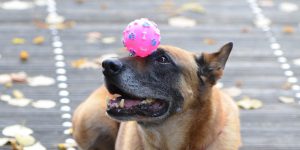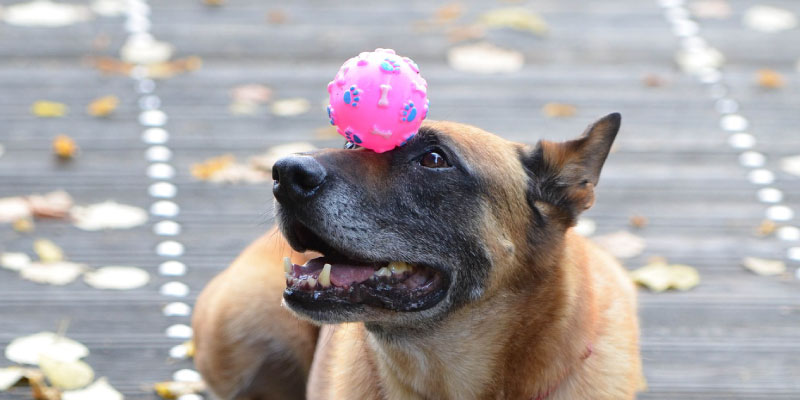When is the optimum time to teach your dog? If you rescue a dog will you ever get them to behave? Is it easier to train puppies or older dogs? So many questions, so little time...
The burning question when you adopt a new dog, especially if you get a dog slightly later on in life, you might be wondering... is my dog too old to learn new tricks? Good news – it’s not too late. You will just need to have a little more patience.

Maybe you’ve read that the optimal training period for puppies is 7 to 16 weeks, and you’ve missed the window. How hard is it to teach a 6 month old puppy to behave?
Whether you’ve recently adopted a one year old puppy or an 8 year old senior, it’s never too late to teach them tricks, good manners and socialisation. You may struggle more than most, depending on the life experience they’ve had, and you may have to accept that you might never get rid of some behaviour completely.
If your dog had a difficult start in life, and is anxious around other dogs, you may never get them to play and frolic in the park with complete strangers, but you might get them to be calm as long as you are around.
With a little bit of patience and a whole load of rewards, you can turn negatives behaviours into positive ones. No dog is beyond help, and no matter when your new family member enters your life, you can always teach a new dog new tricks.
How to teach a dog new tricks
One of the key tips for training any dog, from pup to senior, is positive reinforcement. This means, rather than chastising the dog for doing something wrong, you reward it when it does something right. A simple treat is all it takes most of the time.
But when it comes to teaching an older dog, you will have to consider it’s character, it’s past (if you know it) and any learnt behaviour.
Imagine a human trying to learn a new language later in life, rather than picking it up from birth. It’s not going to be easy, be patient.
It’s the same principle. The good news is, you won’t have to deal with the trials and tribulations of puppy training too. You might even find an older dog is more receptive!
Start slow and don’t tire them out with anything too strenuous. Basic commands like ‘sit’ and ‘stay’ are a good place to start. Likewise, pay attention to the signs that your dog is worn out. Your dog may start sniffing the ground, licking itself, dropping its ears or perhaps the most obvious one – yawning.
Just remember, that the most important aspect to learning new dog tricks is confidence: confidence in themselves and confidence in you. Build that bond between you and the dog, and they will want to please you and listen twice as hard to what you want.
If you have specific problems that you are struggling to teach or re-teach, you may need to get extra help via classes or dog trainers, especially if the behaviour is aggressive or anxiety driven.
Is it harder or easier to teach a puppy tricks?
This one’s a yes and no. On the one hand, your puppy has not learned any other behaviours that need to be ‘unlearned’. However, it will also not be trained in the basics like toilet training or socialising with other dogs, meanings you need to cover those first before you get to anything more complicated.
Some tips to make training your puppy easier include not getting a puppy at Christmas. They say a dog is for life, and it’s true! In a festive environment, there will be far more stimuli which is distracting, and there’s no way you’ll be able to focus on the new puppy with family, friends and gathering around. Give your love one a picture and token of the puppy you’ll pick up on January 1st, if the timing works out.
The weather plays a bigger role than you might think. Try to get your first puppy in the spring or autumn if possible, so that you can start walks in pleasant weather and not subject both of you to the elements – whether too hot or too cold. You want to give your puppy the best start in life and the best experiences early on.
That said, there’s never a wrong time to get your puppy – it’s when it’s best for you and your family, and allows you the time to spend with the new arrival.
Is there an optimum time to train my dog?
Between 7 and 16 weeks puppies have a natural curiosity that you can use to your advantage. Be kind, be positive, and expose them to as many new experiences as you can – whether that’s sitting in a quiet carpark to get them use to cars passing by, introduce them to the friendly neighbours cat, or take them to the seaside and get them used to the sound of the waves.
At around 14 to 16 weeks, puppies will naturally regress and start to get a little fearful and cautious of new things, so be a little careful around this period and try not to push them too hard as it may give them a negative behaviour that might be hard to break – so barking at the postman, or running after bicycles.
If you are talking about time of day, then no. There is no specific time or place that is best to teach your dog.
As a general rule, especially if your dog is nervous or lacking in confidence, go somewhere quiet, with no distractions, where he can concentrate completely on you. Some trainer recommend you do the training a little bit before dinner, so they have an extra incentive to get those treats. But if your dog is food led, then a time that suits you is often best.
The only thing we will warn you about is that some activities, such as fetch, throw, come, obstacles or running are (by their nature) very active. Avoid those right before bed as, just as you might imagine, with all that adrenaline pumping they might find it hard to settle again straight away.
Keep things simple and short
At the end of the day, any time spent with your new dog, even if it’s just sitting on the floor and giving him treats and praise as he gets comfortable around your home, is time well spent.
Once you start trying to teach them a few simple dog tricks, or even more complicated ones, keep the training sessions short. You could probably spend 5 or 10 minutes on a new exercise, and then do another 20 minutes of tricks and games (s)he knows and loves. Don’t let them get annoyed, tired, or start feeling negative about training.
The whole experience should be fun for you and for them. If it’s starts to get frustrated, change tactics, try a new game, or just cuddle and play. The better the bond, the easier it will be to keep teaching old and new dogs tricks.




